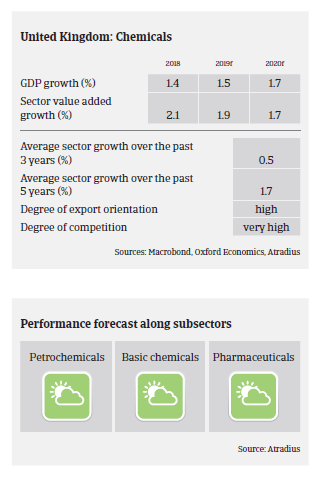Profitability of businesses is generally high in this sector, but Brexit poses a downside risk for businesses profitability and payment behaviour.

- The British chemicals and pharmaceuticals industries add about GBP 18 billion of value to the UK economy every year, and combined they are the largest exporter of manufactured goods. Chemical products account for about 4.5% of exported goods, while pharmaceutical products represent about 8% of goods exported. The pharmaceutical sector is part of a global industry in which the UK is a leading European market and producer.
- The chemicals and pharmaceuticals industries mainly comprise small to medium Enterprises (SMEs) and microbusinesses, while a number of major firms are headquartered in the UK. The majority of businesses are mature with a stable customer base, as high entry barriers protect the industries (regulatory requirements and required high capital expenditure).
- Profitability of businesses is generally high in this sector and the profit margin outlook for the coming 12 months is stable. A large number of chemicals businesses rely on asset-based finance for financing. Bank financing facilities are adequate and business refinancing does not appear to be a problem.
- On average, payments in the British chemicals sector take between 60 days and 90 days. Payment experience has been very good over the past couple of years and the level of protracted payments is very low. The number of non-payment and insolvency cases was low in 2018 and H1 of 2019. This trend should remain unchanged in H2 of 2019. This means that the industry is bucking the overall trend in British business insolvencies, which we expect to increase 7% this year.
- For the time being our underwriting approach to the chemicals sector remains generally positive for all major subsectors (basic chemicals, petrochemicals, and fine and specialty chemicals). The same accounts for the pharmaceuticals industry.
- However, the potential repercussions of Brexit pose a downside risk for businesses profitability and payment behaviour in the mid-term. Both chemicals and pharmaceuticals are part of a tightly integrated EU supply chain that relies on friction-free transfer of ingredients and finished products. At the same time, the EU accounts for 60% of British chemicals and pharmaceuticals exports.
- In case of a hard Brexit the main impact would be tariff increases, with both exports and imports susceptible to WTO tariffs. Additionally, exchange rate losses for businesses could pose a serious risk.
- The agricultural/farming sector could be severely impacted in the event of a hard Brexit due to major changes in the subsidy system (with the expiry of EU subsidies there is the need to replace them with a national scheme). This could negatively impact the agricultural chemicals subsector.
Kapcsolódó dokumentumok

826KB PDF
